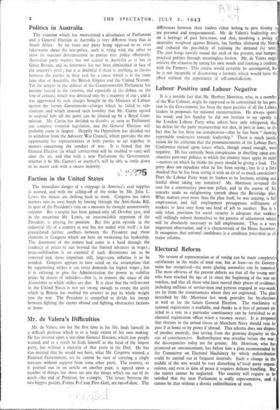Faction in the United States
The immediate danger of a stoppage in America's coal supplies is averted, and with the calling-off of the strike by Mr. John L. Lewis the miners are drifting back to work. Congress has taken matters into its own hands by forcing through the Anti-Strike Bill, in spite of the President's veto on a measure he thought unnecessarily extreme. But a respite has been gained only till October arst, and in the meantime Mr. Lewis, an irreconcilable opponent of the President, is playing for position. But this grim episode in the industrial life of a country at war has not ended with itself ; it has precipitated further conflicts between the President and those elements in Congress which are bent on weakening his leadership. The discontent of the miners had come to a head through the tendency of prices to run beyond the limited advances in wages ; price-stabilisation is an essential if such discontents are to be removed and, more important still, large-scale inflation is to be avoided. Congress appears to have acted on the assumption that by suppressing strikes it can resist demands for higher wages ; but it is refusing to give the Administration the power to stabilise prices by means of subsidies—that is, to remove the cause of the discontents to which strikes are due. It is clear that the will-to-war in the United States is not yet strong enough to create the unity which in Britain has enabled the country to put its whole weight into the war. The President is compelled to divide his energy between fighting the enemy abroad and fighting obstructive factions at home.


























 Previous page
Previous page